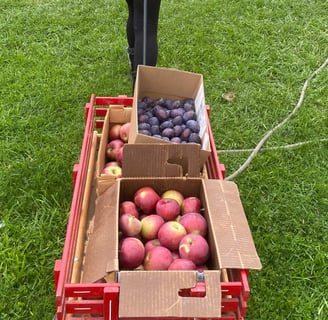Understanding Modern Day Homesteaders: A Lifestyle Reimagined
Modern day homesteaders are individuals who live a lifestyle of self-sufficiency and sustainability, blending urban gardening, traditional skills, and eco-friendly practices to live a greener life.
1/21/20251 min read


What is Modern Homesteading?
Modern homesteading is a lifestyle movement that embraces self-sufficiency and sustainability. Unlike the traditional notion of homesteading, which involved farming, livestock, and rural living, contemporary homesteaders adapt these principles to fit urban and suburban settings. This lifestyle focuses on creating a sense of connection with the land, enhancing food security, and promoting eco-friendly practices. In essence, modern-day homesteaders strive to lead resilient and sustainable lives in an ever-changing world.
How Do Modern Homesteaders Live Today?
Living as a modern homesteader involves blending various aspects of life, including urban gardening, DIY projects, and a conscious effort to adopt greener habits. Many urban dwellers turn their balconies or small yards into productive vegetable gardens, while others may join community gardens. Such efforts provide fresh produce and foster a sense of community.
Furthermore, modern homesteaders often incorporate canning and food preservation techniques to make the most of seasonal bounty. They may participate in farmer's markets, trade with local producers, or even raise chickens for eggs. The lifestyle emphasizes a return to traditional skills while using technology to enhance efficiency. This is evident in the increasing popularity of online workshops and social media groups dedicated to homesteading.
Benefits of the Modern Homesteading Lifestyle
The many benefits of modern homesteading cannot be overstated. First, it promotes healthier eating habits—homegrown food is often more nutritious than store-bought options laden with preservatives. Second, modern homesteaders tend to significantly reduce their carbon footprint by sourcing ingredients locally and practicing sustainable living.
Moreover, the homesteading journey cultivates invaluable skills such as gardening, cooking, sewing, and even woodworking. These abilities enhance self-sufficiency and can also serve as a gratifying hobby. Many individuals find a profound sense of fulfillment in knowing they are actively creating a healthier environment.
In conclusion, modern-day homesteaders adopt a lifestyle that fosters a connection to nature, sustainability, and community. By incorporating elements of self-sufficiency into their day-to-day lives, they play a pivotal role in promoting environmental awareness and resilience. As more individuals explore this path, the modern homesteading movement continues to inspire a return to the basics in our increasingly complex world.
Homesteading Life Guidance
Empowering urban families to embrace homesteading independence.
Resources
Community
info@homesteadinglifeguidance.com
